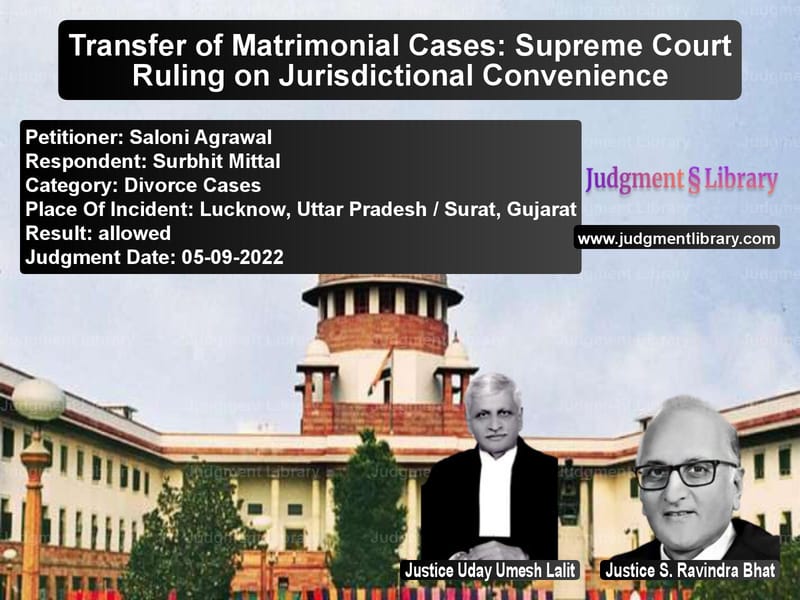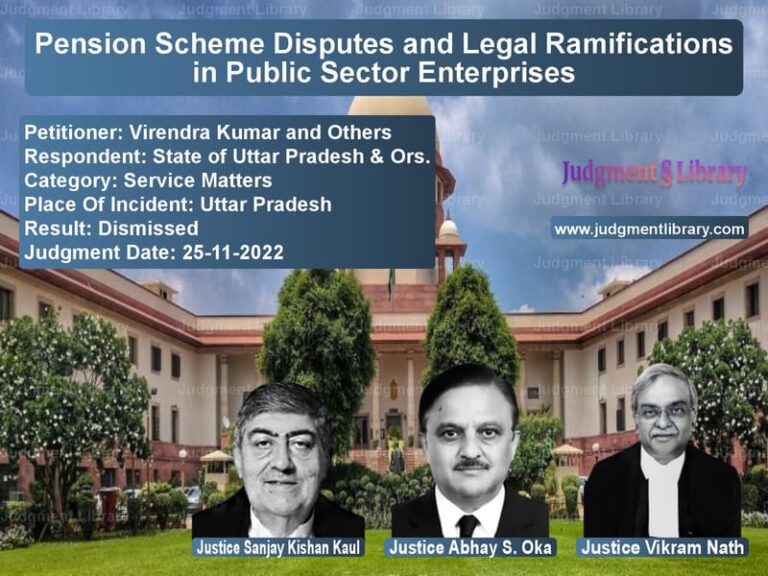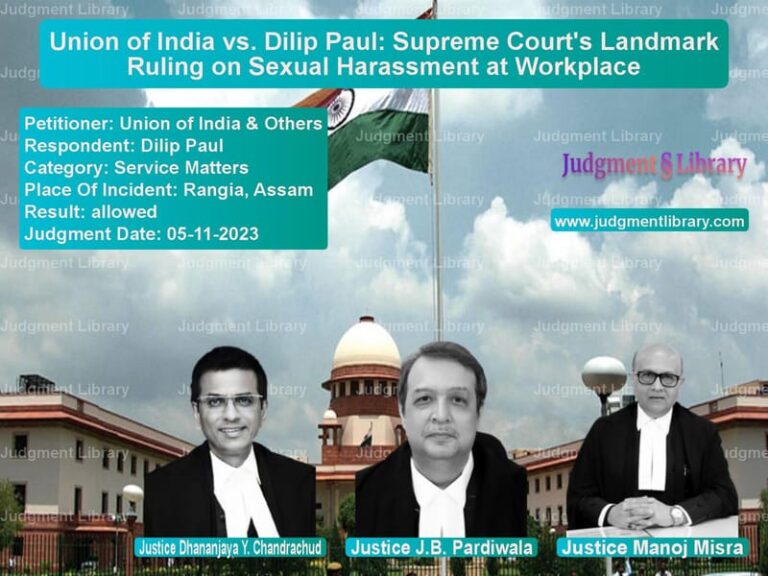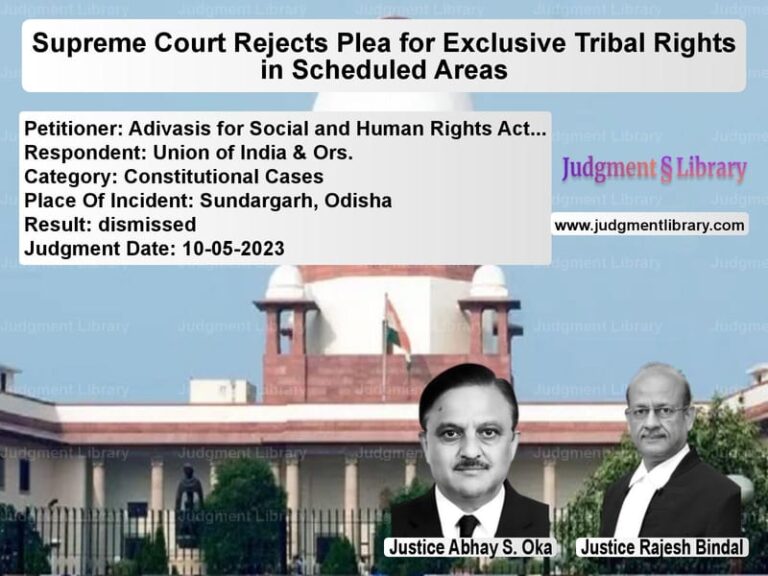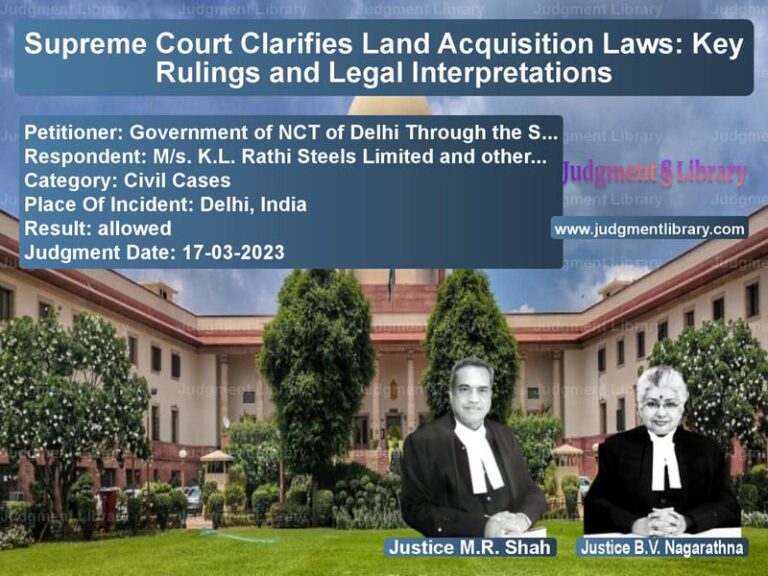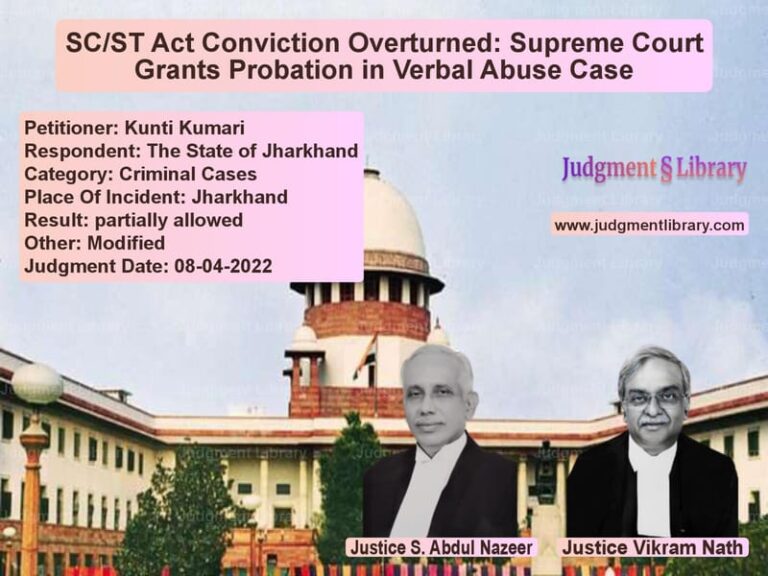Transfer of Matrimonial Cases: Supreme Court Ruling on Jurisdictional Convenience
The Supreme Court recently delivered a judgment in the case of *Saloni Agrawal v. Surbhit Mittal*, which involved a transfer petition filed by the petitioner-wife, Saloni Agrawal, seeking the transfer of a matrimonial case from the Family Court at Lucknow, Uttar Pradesh, to the Family Court at Surat, Gujarat. This case raised the issue of whether a matrimonial dispute, where one of the parties faced hardship in attending court hearings in a distant jurisdiction, could be transferred to a more convenient location for the convenience of the petitioner.
The petitioner had filed the transfer petition under Section 25 of the Civil Procedure Code (CPC), requesting the Supreme Court to intervene in the matter and allow the transfer of the case. The respondent-husband, Surbhit Mittal, did not contest the transfer petition, and the Court issued an interim order staying the proceedings in the Family Court at Lucknow while the case was being heard. On September 5, 2022, the Court allowed the transfer of the matrimonial case to Surat, Gujarat, where the petitioner resided.
Background of the Dispute
The petitioner, Saloni Agrawal, had filed a matrimonial case in the Family Court at Lucknow against her husband, Surbhit Mittal. However, the petitioner was residing in Surat, Gujarat, and traveling to Lucknow for each hearing was causing considerable difficulty. In light of this, she requested the Supreme Court to transfer the case to Surat, where she could more easily attend the hearings and participate in the proceedings without undue hardship.
The respondent, Surbhit Mittal, did not file any objections to the transfer petition. This led to the Supreme Court taking up the matter and issuing an interim order on 27.09.2021, staying further proceedings before the Family Court at Lucknow until the transfer petition was decided. Despite receiving notice, the respondent did not enter an appearance in the Court.
Petitioner’s Arguments
The petitioner’s counsel argued that the distance between Surat and Lucknow was significant, and attending hearings in Lucknow was placing an undue burden on the petitioner. The counsel emphasized that it was difficult for the petitioner to travel to Lucknow due to personal reasons and logistical constraints, including the cost and time required for each journey. Furthermore, the petitioner was residing in Surat, which made attending hearings in that jurisdiction more practical and accessible for her.
The petitioner’s counsel cited the principles of convenience and fairness, stating that transferring the case would allow for a more efficient and less stressful legal process. The counsel also emphasized that the transfer of the case would not prejudice the respondent, as he could still attend the proceedings in Surat. The petitioner requested the Court to consider these factors and grant the transfer petition.
Respondent’s Arguments
The respondent did not appear in Court to contest the transfer petition. Although notice had been served on the respondent, Surbhit Mittal, he chose not to participate in the proceedings, and there were no objections raised to the transfer. As a result, the respondent did not argue against the petitioner’s request for a transfer of the case.
Court’s Reasoning
The Supreme Court carefully considered the arguments of the petitioner and examined the circumstances surrounding the transfer petition. The Court noted that transfer petitions under Section 25 of the CPC are generally allowed when it is shown that the convenience of the parties would be served by such a transfer. The Court also noted that in matrimonial cases, it is especially important to ensure that the parties can attend the hearings without facing undue hardship.
The Court observed that the petitioner, Saloni Agrawal, resided in Surat, Gujarat, and that attending court hearings in Lucknow was causing her significant difficulty. The Court acknowledged that matrimonial disputes, being emotionally charged, require the parties to be able to fully participate in the proceedings, and the petitioner should not be burdened with travel-related hardships that could hinder her participation.
The Court also noted that the respondent had not contested the petition, and no objections had been raised against the transfer. The Court found that transferring the case to Surat, where the petitioner resided, would not cause any prejudice to the respondent, as he could still attend hearings in Surat if necessary.
Judgment
The Supreme Court allowed the transfer petition filed by Saloni Agrawal. The Court ordered that the matrimonial case, H.M.A. No. 920 of 2021, titled “Surbhit Mittal v. Saloni Agrawal,” pending before the Family Court at Lucknow, Uttar Pradesh, be transferred to the Family Court at Surat, Gujarat. The Court also directed that the entire record of the case be transmitted to the transferee court immediately for further proceedings.
The Court instructed the Registry to send a copy of the order to both Family Courts to ensure compliance with the directions. The Court emphasized the importance of facilitating the fair and efficient resolution of matrimonial disputes by considering the convenience and accessibility of the parties involved.
Conclusion
The Supreme Court’s ruling in this case highlights the importance of ensuring that parties to a matrimonial dispute can attend hearings without facing undue hardship. By allowing the transfer of the case from Lucknow to Surat, the Court demonstrated its commitment to facilitating the fair resolution of legal matters by considering the practical realities of the parties involved. This decision also underscores the flexibility of the legal system in accommodating the convenience of parties, especially in sensitive matrimonial cases.
The judgment sets a precedent for future cases where a party may seek a transfer of a case to a more convenient jurisdiction, particularly in matters that involve personal and emotional distress, such as matrimonial disputes. The Court’s approach emphasizes the importance of accessibility and fairness in legal proceedings, ensuring that all parties have the opportunity to fully participate in the process.
Petitioner Name: Saloni Agrawal.Respondent Name: Surbhit Mittal.Judgment By: Justice Uday Umesh Lalit, Justice S. Ravindra Bhat.Place Of Incident: Lucknow, Uttar Pradesh / Surat, Gujarat.Judgment Date: 05-09-2022.
Don’t miss out on the full details! Download the complete judgment in PDF format below and gain valuable insights instantly!
Download Judgment: saloni-agrawal-vs-surbhit-mittal-supreme-court-of-india-judgment-dated-05-09-2022.pdf
Directly Download Judgment: Directly download this Judgment
See all petitions in Mutual Consent Divorce
See all petitions in Alimony and Maintenance
See all petitions in Child Custody
See all petitions in Property Division in Divorce Cases
See all petitions in Dowry Cases
See all petitions in Judgment by Uday Umesh Lalit
See all petitions in Judgment by S Ravindra Bhat
See all petitions in allowed
See all petitions in supreme court of India judgments September 2022
See all petitions in 2022 judgments
See all posts in Divorce Cases Category
See all allowed petitions in Divorce Cases Category
See all Dismissed petitions in Divorce Cases Category
See all partially allowed petitions in Divorce Cases Category

